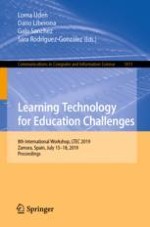2019 | OriginalPaper | Buchkapitel
Using Social Media to Enhance Learning and Motivate Students in the Higher Education Classroom
verfasst von : Eva Lahuerta-Otero, Rebeca Cordero-Gutiérrez, Vanessa Izquierdo-Álvarez
Erschienen in: Learning Technology for Education Challenges
Aktivieren Sie unsere intelligente Suche, um passende Fachinhalte oder Patente zu finden.
Wählen Sie Textabschnitte aus um mit Künstlicher Intelligenz passenden Patente zu finden. powered by
Markieren Sie Textabschnitte, um KI-gestützt weitere passende Inhalte zu finden. powered by
